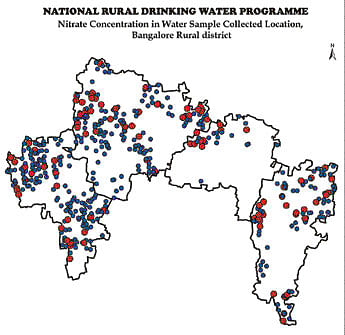
Borewells in Bangalore Urban and Rural areas have shown the presence of high levels of nitrate, total hardness, pH and fluoride content, according to a recent study conducted by the Department of Mines and Geology.
The State Water and Sanitation Mission is implementing the Rajiv Gandhi National Drinking Water Mission, a programme under the National Rural Drinking Water Programme.
Over 1,500 samples collected from Bangalore Urban, Bangalore South, Nelamangala, Doddaballapur, Devanahalli, Hoskote, Ramanagara and Magadi were tested.
Nitrate
Of the 792 samples collected from Bangalore Urban areas 244 samples showed high levels of nitrate content. The highest level of nitrate content was recorded in Kithiganuru in Avalahalli. Whereas, in Bangalore Rural district, 113 samples of the total 488 samples collected were found to be not potable. The water had 485 mg/L of nitrate, much above the permissible level.
In Magadi Taluk, Ramanagar district, 39 samples of the total 215 samples were found to be contaminated with 249 mg/L of nitrate.
Hoskote, Doddballapur and Nelamangala in Bangalore Rural were found of have high levels of nitrate content. Water containing more than 45 mg/L of nitrate is considered as unfit for drinking and can lead to cancer.
However, nitrate can be removed through simple methods of distillation, reverse osmosis and ion exchange process. It should be noted that boiling would only increase nitrate content in water. Drilling borewells at locations that are farther away from dump yards and avoiding use of manure will curb water contamination.
Fluoride
Sakkeregollahalli Gram Panchayat, Lingapura Colony and Doddaballapur taluk in Bangalore Rural district recorded highest levels of fluoride. Whereas Magadi taluk in Ramanagar district, Chikkaiahanapalya Gram Panchayat, Kariyamanapalya village showed high levels of fluoride. A high concentration of fluoride causes fluorosis and numerous allergies. Arebinnamangala village also recorded high level of fluoride.
Ion exchange, adsorption and coagulation process can purify water contaminated with fluoride. Eating fruits like guava, lemons, orange, goose berries which are rich in Vitamin-C and calcium-rich food like groundnut, milk and palak are effective in combating fluorosis.
Total hardness
Among the samples collected from Bangalore Urban district, total hardness in water ranged from 48 mg/L to 1,540 mg/L and in Bangalore Rural district hardness ranged from 72 mg/L to 1,416 mg/L. In Magadi taluk, hardness in water ranged from 18 mg/L to 864 mg/L.
Domestic and municipal waste contribute to 'hardness' in water, which in turn contributed to incrustation, scale formation in boilers and results in adverse effect in domestic use.
Concentration of calcium and magnesium are the main causes for hardness of water.
Temporary hardness in water can be removed by boiling, which precipitates carbonates of calcium and magnesium. However, water softners are used to overcome permanent hardness.